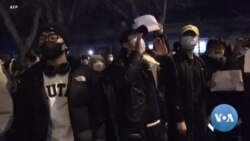A measured response from the White House on protests against zero COVID policies across China.
Welcome to VOA Asia Weekly. I'm Chris Casquejo in Washington. That story is coming up, but first, making headlines.
Former Chinese President and head of the ruling Communist Party Jiang Zemin died at his home in Shanghai on Wednesday from leukemia and organ failure. He was 96. He’s credited with breaking the country out of diplomatic isolation after the bloody Tiananmen Square crackdown, mending fences with the United States, and overseeing an unprecedented economic boom.
The U.S. Navy on Tuesday dismissed Beijing’s protests over a "freedom of navigation operation” conducted near a Chinese-held island in the South China Sea. China called the action from the U.S. guided missile cruiser “illegal.” The Navy said the encounter is the first in the South China Sea since U.S. President Joe Biden and Chinese leader Xi Jinping met in person two weeks ago.
U.S. and Indian troops on Wednesday participated in a high-altitude training exercise in cold, mountainous terrain in the Himalayas about 100 kilometers from the Line of Actual Control, a disputed border that separates Chinese and Indian-held territories.
North Korean leader Kim Jong Un took his daughter to a meeting with missile scientists in her second public appearance, in which state media called her his "most beloved" child, deepening outside debate over whether she is being primed as his successor.
A court in Tokyo ruled Wednesday that Japan’s ban on same-sex marriage was constitutional but said inadequate legal protection violates same-sex couples’ human rights.
Protests against zero COVID policy escalated across China in the days following a tragic fire in the locked-down city of Urumqi that killed ten people, with demonstrators throwing objects at police in the city of Guangzhou Tuesday night. Authorities have responded by loosening some pandemic restrictions, while seeking out those who have taken part in the demonstrations.
The White House is walking a fine line with China, its greatest competitor, by openly expressing support for the peaceful protests popping up around the massive country. But as VOA’s Anita Powell reports, administration officials are weighing their words carefully about the strict “zero-COVID” policies behind the protests.
More than a dozen street protests have shaken several Chinese cities in recent days, after a deadly fire killed 10 people in a locked-down apartment complex, sparking widespread anger over the nation’s strict COVID controls.
At the White House, the reaction has been measured.
“Our message to peaceful protesters around the world is the same and consistent: people should be allowed the right to assemble and to peacefully protest policies or laws or dictates that they take issue with.”
But, Kirby added, the administration was careful in discussing Beijing’s strict management of the pandemic, which has led to school and business closures and kept tens of millions of people house-bound.
“Lockdown is not a policy that we support here.”
On Capitol Hill, U.S. lawmakers are more blunt, highlighting protesters’ complaints about Chinese government censorship, symbolized by pieces of blank white paper.
“We’re seeing the Chinese people stand up against the draconian approach of the communist party of China, and concerned not only about COVID policies, but also about censorship.”
China’s government has pushed back against the charge that the apartment fire, which happened in northwestern China's Xinjiang region, home of the minority Muslim Uyghur people, is related to their pandemic policies.
"It's true that on social media there are forces with ulterior motives that relate this fire with the local response to COVID-19."
He did not say when the government’s policy would end.
Those watching closely say one thing is clear: These protests are extraordinary.
“That is a type of thing that gets people thrown in jail. So it is a real shock that people are willing to say that in public, out loud and be recorded and try to also mobilize other people to support that. I mean, it's a sign of just how frustrated people are now. I wouldn't say that this is, you know, a movement or anything like that.”
Already, protesters have marched in other cities around the world.
Anita Powell, VOA News, the White House.
Visit voanews.com for the most up-to-date stories. You’re watching VOA Asia Weekly.
Finally, a small charity in Indonesia is rehabilitating and releasing hundreds of captive orangutans back into the wild in Borneo.
In the past few weeks, three male orangutans have been released into their natural habitats.
Currently, the Borneo Orangutan Survival Foundation has more than 400 orangutans still in rehabilitation waiting to be released, a process that can last eight years.
Thanks for watching VOA Asia Weekly. I’m Chris Casquejo. Until next week.












